Staff Inquiry: The 20 Best TV Shows of 2020

Reyzando Nawara is a passionate film and TV enthusiast from…
Let’s face it, the pandemic has changed everything, including the way we live and the way we consume entertainment. With most cinemas still shutting down, leaving us stuck at home with nothing much to do, TV has become our number one companion throughout 2020. But it’s not entirely a bad thing, most especially considering the big leap that TV writers and creators have been making for years. From bonkers horror like Lovecraft Country to inspiring comedy like The Good Place, TV has offered us plenty of entertainment during quarantine and lockdown; some are great and some others, not so much.
Our writers have compiled a list of the 20 best TV shows of 2020 that you can still get on in case you haven’t seen them. Without further ado, here’s the list:
Better Call Saul Season 5
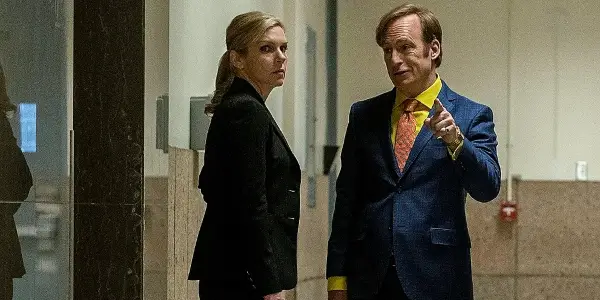
There’s great TV and then there’s masterful. The kind that week after week, episode after episode, leaves you in a state of wonder and dazzlement. As much great TV as I watched this year, it was hard to find anything that managed to reproduce the intoxicating high of watching Better Call Saul. When the series debuted in early 2015, it seemed little more than a charming victory lap, a chance to squeeze one last drop out of the Breaking Bad phenomenon and capitalize on a series that only peaked in popularity in its final season. But, despite what I would call a brief hiccup of a second season, Saul has managed to flourish, carrying the baton of greatness to the point where it now looks to possibly surpass its predecessor’s image. Though why should any of us be surprised? Part of the thrill in watching Breaking Bad was seeing it improve with each passing season.
Just when you thought the series couldn’t climb any higher, it dazzled you with something new and unexpected, whether in its writing, direction, or Emmy winning performances. And, with an electric, often shocking final season, Breaking Bad managed to end on a high note of artistry, not just popularity. And so, in hindsight, it makes sense that creator Vince Gilligan and his team of fellow writers and craftsmen would tackle the follow-up series with even more confidence and expertise at making television. Better Call Saul has become the current era’s best example of experience generating excellence, those who make TV perfecting their craft simply by learning and growing.
But, the series has also taken the inevitability of a prequel, knowing where things will ultimately end up, and let it free the show, making it more nimble and able to explore the cracks and spaces in between, rather than fall into the common trap of building to an already known destination. Saul is able to deepen the material, showcasing the minutia of the character’s processes and explore a more complicated depiction of moral descent than even Bad did, along with allowing secondary characters to surprise, delight, and connect in a way that would otherwise be reserved for leads. – Jesse Nussman
Better Things Season 4
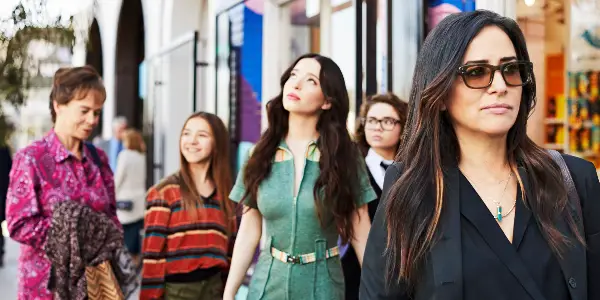
Compared to the other shows in this list, Better Things might look like the inferior one. After all, the basic premise of the series is about the daily life of an American single mom who’s taking care of her three daughters and her own mom. See, it has no plot, and the characters’ arcs are so fluid. But that’s what, in the end, makes Better Things such a rare show. There is no unnecessary plotline being shoehorned in each episode; everything is flowing naturally like water, both refreshing and soothing.
Pamela Adlon, the creator of the show, is, once again, flexing her directorial and writing muscle in this season. The performances from the cast are so authentic it almost feels like watching real-life unfolds before your eyes. If you haven’t had a chance to see it, you need to get it off your watchlist as soon as possible. It’s lovely, warm, and comforting, and in a year where everything feels like hell, Better Things is exactly what we need. – Reyzando Nawara
The Crown Season 4
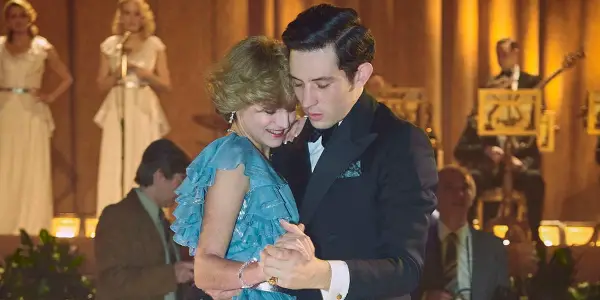
Growing up, Princess Diana is one of the first larger than life celebrities I remember. My mother was as enamored as the rest of the world, and I shortly followed suit. The humanitarian aid, her royalty status, and the subsequent untimely death all culminated into a fascination of her life and the British Monarchy. Yet, as a child, there was only so much to comprehend and to understand. While a fictional recreation of the events that transpired during the first decade of Diana’s inclusion within the royal family, The Crown delivers in its fourth season a captivating and at times jaw-dropping delivery that makes it the best one thus far. Excellence is nothing new for The Crown, the many wins and nominations to prove it.
High-quality filmmaking and narrative craft have allowed a whole new generation to be introduced to the reign of Queen Elizabeth and those that surround and support her. While not always true to the history it portrays, it has opened the doors for many to dive deep into the history of the Monarch. With the introduction of Princess Diana (played brilliantly by Emma Corrin) into the storyline, it not only answered the anticipation of viewers, but also drummed up former dislike for some of the real-life figures themselves. And while the fourth season has a heavy-handed focus on Diana, paralleling the attention she received over the family in the 80s and 90s, it is not without its attention to the rest of the royal family that has been with the story since the beginning. The Queen is shown in her prime and a force to be reckoned with, years of experience and insight culminating to one of her strongest decades of reign – and what a challenge it posited. Her children and family too are portrayed struggling as much as Diana, though while her newly minted royal status makes her less able to handle, the emotional isolation and expectation of royal life is felt by all.
Margaret Thatcher is also brought to the forefront, her time as Prime Minister shaping a country, challenging its Head of State, and questioning the validity and necessity of the royal family. All with Gillian Anderson behind the portrayal in one of her most memorable performances to date. There are many who had issues with this season of The Crown. For some, it could be that the parallel between Diana and the departure of Prince Harry and Meghan Markle is too fresh. For others, the refocused attention from the Queen the series was trying to portray turning to the People’s Princess broke the narrative design of the series. For many, old wounds were reopened, the affairs of the past that sparked downward spiral ones many think best laid to rest. Yet, with all that, there are an overwhelming amount of viewers pleased with the portrayal, and the introduction, ready to see how the creators behind the hit series will handle the even more tumultuous and devastating decade to come. – Stephanie Archer
Dark Season 3
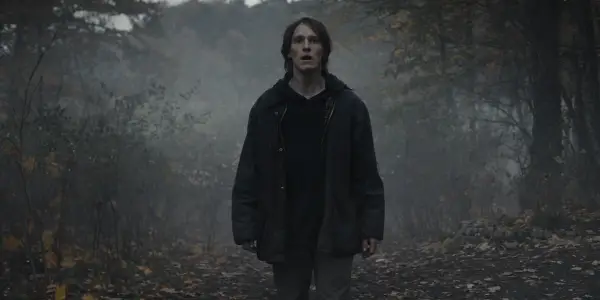
One of the more complex series to ever be made, Dark’s final season features three centuries, countless timelines, and multiple versions of the different characters on-screen at the same time. It requires recaps, family trees, and your utmost attention.
The German time travel saga rewards that attention, though, with a payoff deserving of accolades that it likely will not receive. Through its three seasons, Dark concerned itself with a number of things, including but not limited to: time, truth, love, suffering, fate, free will, and world destruction. At its heart, the series deals with loss. Characters lose their innocence, their loved ones, their time, their control, and their hope for a brighter future.
The show’s bleak and baffling nature might make it difficult to continue watching, but if you give yourself fully to Dark, you experience beautiful truths: the fleeting nature of time, the power of love, the humanity of loss, and the necessity of change. Few sci-fi shows have stuck the landing quite like Dark, and for that reason (and many others), it remains one of Netflix’s smartest series, and one of the year’s best triumphs. – Michael Frank
Dispatches from Elsewhere
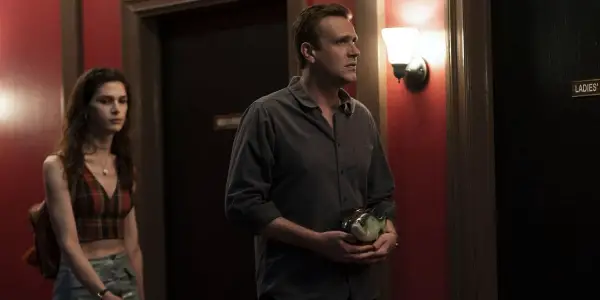
Dispatches from Elsewhere came and went back at the beginning of the pandemic, premiering back in March of 2020, before we all knew we’d be inside for the next 10 months. As the show continued, with episodes coming out in the traditional week-by-week format, it grew its sense of wistful magic. Creator Jason Segel bears himself throughout the show, especially in its finale, and though the meta-narrative doesn’t always hit high marks, the simple honesty displayed makes its mark.
Segel is joined in a stellar cast by André Benjamin, Richard E. Grant, Sally Field, and Eve Lindley, three veterans (more-or-less) and a newcomer. Lindley steals the series, though, as a trans actress playing a trans woman, with her romance with a straight Segel making representative strides, with Segel clearly and rightfully pushing for Lindley’s presence to be felt in each episode. Framed within the confines of a mysterious game seemingly existing just outside their daily lives, Dispatches from Elsewhere works best as a fun, creative, and insightful look at monotony, connection, and the fragile yet precious nature of relationships. Segel’s series ends on a note of truthfulness, thankfulness, and hope. In a year lacking those three in abundance, Dispatches from Elsewhere should be welcomed with open arms. – Michael Frank
The Great
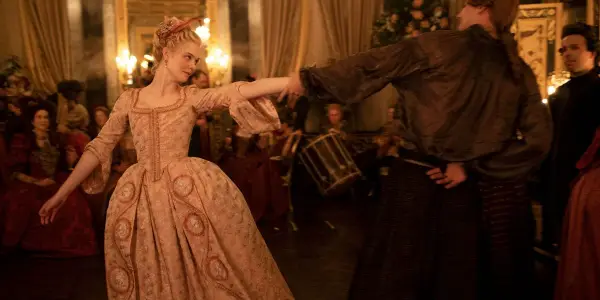
Honestly, I can not recommend The Great enough. One of the best new series of the year, one if you missed it you need to see it immediately. While period pieces have found success over the years, their episodic installments allowing for deeper character development and inclusion of detail, The Great finds much of its success in the humor it is able to garner. And while the humor had the potential to run dry on its extended run, it’s as resilient as its Queen. The Great follows the story of Catherine, Empress of Russia, from her marriage all the way to the start of her reign. It is engaging as it is humorous, the fictionally recounted tale of the future Russian ruler unafraid to be quirky and unusual. With an unrelenting menagerie of characters and a solid cast to bring them to life, The Great is a series you will yourself wishing there was more once it ends.
Heading the incredible cast, Elle Fanning brings to life a solid induction of Empress Catherine, as well as a strong female lead. She exhibits an enticing appeal to her portrayal, the innocence of youth coupled with intelligence and education not commonly encouraged at the time. Catherine radiates under her care, each element of her failures and triumphs only further driving her character. But Elle Fanning is not the only one that owns their part, delivering a memorable performance. Nicholas Hoult is at his finest as Peter III of Russia, stretching his comedic chops and displaying clear enjoyment in the character he has brought to life. While he had the chance to deliver period themed humor in The Favourite, here he breaks from the confines of what is expected. So if you missed this one on your numerous 2020 binges, dive into Hulu’s brilliant series as soon as you can. Huzzah! – Stephanie Archer
The Haunting of Bly Manor
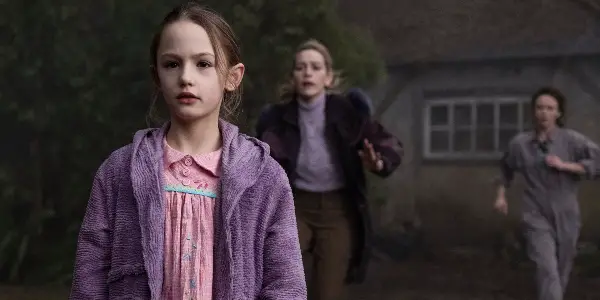
I should preface this with, I’m a sucker for a good haunting story. You may say, it’s one of my niches. A haunting, love story? I’m all in. “This isn’t a ghost story, it’s a love story.” This one line, concluding The Haunting of Bly Manor, sums it up the best way it can. This is a romance at its core, making Mike Flanagan’s follow up a beautiful tale that weaves the two seamlessly. Let me say, I adore this second series, for a variety of reasons. It’s a beautifully gothic tale that resonated long after I finished. And I gobbled up the season in a day. That’s how invested I was. Who isn’t haunted by love?
After the first season, one that surprised me with its ability to be eerie and emotionally powerful at the same time, I wasn’t sure how the follow up would compare. In the end, I’ve realized it’s almost unfair to contrast these two varied looks at a genre that thrives most when it pivots rather than stays in one place. This take has some of the same faces, Flanagan’s signature texture and feel, but the story is one that stands on its own. Going after a similar, and winning, strategy of a slow reveal, there are some episodes that provide standalone backstories for specific characters. This is something that I’m grateful was continued because it bodes well for this form of storytelling.
There are elements of the story, that I won’t specify because I don’t want to spoil, that weren’t entirely fleshed out. There were answers, but it still invokes questions. While, like most, I want more, that isn’t necessarily a bad thing. Not all ends need to be tied into a neat bow, and any loose ends or plot gaps, don’t ruin the overall fit. It was still compelling, emotionally enthralling, and ultimately, memorable. What’s important to consider is how moving each of these two seasons is in very different ways. Each is unique and haunting. This was a specter in another way. The scars of lost love, of secrets, kept, and of the ultimate sacrifice, are all exceptionally potent. The Haunting of Bly Manor is a must-watch. Perfectly splendid. – Kristy Strouse
High Fidelity
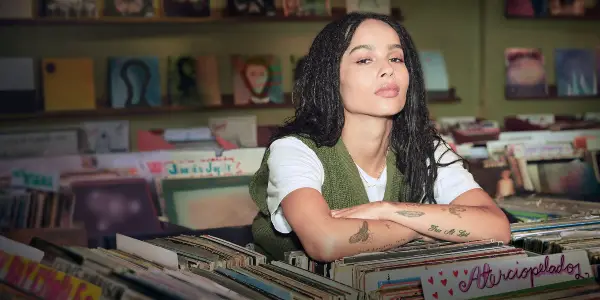
As a fan of the novel and the 2000 John Cusack version, I wasn’t sure how I’d feel going into the new Hulu adaptation of High Fidelity. Turns out, I quite enjoyed it, and I’m saddened to hear of its cancellation. I wanted to see where this story would go, but none the less, I still think it deserves a watch. Zoë Kravitz steals the show as the lead, dealing with the huge blow of a breakup, set to an amazing soundtrack while navigating her next steps. She’s quite phenomenal, directing this ensemble cast of love interests, work friends, and inspiring narration.
An owner of a record store in Brooklyn, the series takes some interesting and well-done shakeups from its previous takes. It’s inventive, bold, and the cast totally sells it with a mix of humor and endearing drama. Nobody is perfect, and this is a wonderfully acute take on the difficulties of adulting and romance.
For me, High Fidelity is an amalgamation of details: relationships, music, and the quest of growing into your true self (which usually requires some miss-steps). It’s a fun show with terrific writing, amazing soundtrack choices, and one that’s closed with its terrific performances. The casting of this series, which may live, unfortunately, as a one-hit-wonder, should still be discovered. Come for the acting, stay for the music, that’ll long live on. – Kristy Strouse
How to with John Wilson
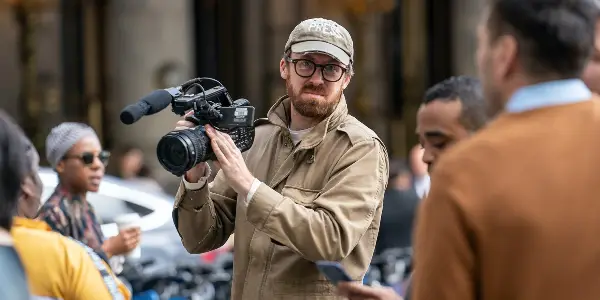
How To with John Wilson’s six episodes attempt to tackle minor, inconvenient problems. From covering your furniture and making small talk to splitting the check and cooking the perfect risotto, creator, filmmaker, and New York guide John Wilson takes you inside his mind with his handheld docuseries. Wilson doesn’t hide his anxiety drummed up by these daily worries. He leans into it, cutting together shots of people around the country, as he travels to find the answers to some of life’s questions, talking to America’s oddest and most human characters.
The series, executive produced by Nathan Fielder, wouldn’t work without Wilson. His feeble, kind nature is reflected by his lack of willingness to show himself on camera, his unwillingness to let go of his camera, and his joy in finding out the minute details about referee organizations, a beach bro’s loss, or even the ins and outs of the scaffolding business. Permeated with Wilson’s narration, each episode becomes a meditation for the filmmakers, and his corresponding audience, on little mysteries and minutia. You follow Wilson as he investigates in his own way, following those that are open to sharing about their life and their passions, regardless of their absurdity. He seems less concerned with fact and fiction, and more focused on finding any semblance of societal truth or commonality.
How To with John Wilson finds its footing in its creator’s own relationships and insecurities, ending its first season with its strongest, most empathetic episode. Wilson tries to make his landlord’s favorite dish: risotto. It’s the only episode in the current world, one tattered and isolated by the COVID-19 pandemic, and it shows Wilson’s own presumed loneliness and seclusion over the last 10 months. His relationship with his landlord, usually filled with dinners and Jeopardy, has been minimized to a plethora of waving. Wilson’s goal of making a risotto becomes a journey of acceptance, friendship, love, tradition, and the effect of a simple gesture. In a year filled with difficulty, Wilson transforms into an avatar for each of our anxieties, as well as our hopes for a more bearable, more connected future. – Michael Frank
I May Destroy You
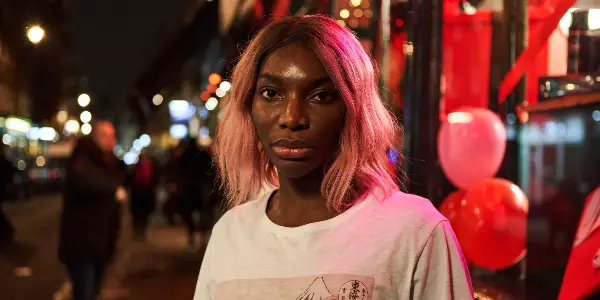
How does one talk about hookup culture but also the trauma of sexual abuse at the same time? It’s definitely not an easy one to discuss. Not only because it’s something that our society hasn’t been fully normalizing, but also because of how uncomfortable it is. But Michaela Coel’s brilliant HBO limited series I May Destroy You offers an answer to that difficult question without ever once trying to simplify it. What she does is play with a gray area really well. Instead of trying to lecture us about these topics, she gives a fully-realized experience about what it feels like to go through sexual abuse in an era of social media and modern hookup culture, where the line between consent and dissent is pretty blurry. The result, however, is an excellent show, one that dares to go beyond the horizon and, in the process, exuding a rare kind of empathy. – Reyzando Nawara
The Mandalorian Season 2
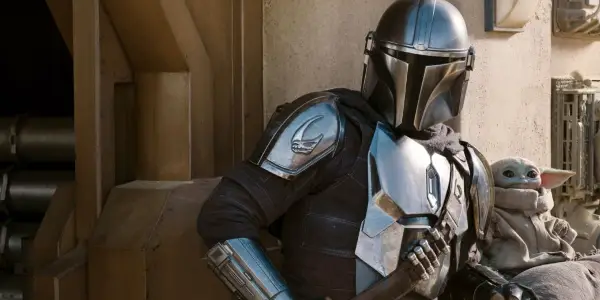
Is there balance in The Force? Who’s to say but the overwhelming popularity of Disney+’s first Star Wars series seems to indicate the once fractured fan base might be more unified than one might think. While financially successful, the mouse house’s recent run of pictures set in that far, far away galaxy (including three canonical sequels and two spin-off prequels) may have demonstrated some of the franchise’s limitations. Star Wars as a piece of popular culture now holds too much baggage, with each entry in the primary saga of movies having to exist under the weight of not just previous entries but generations of fan expectations. The recent movies felt crushed under the weight of those expectations and yet, The Mandalorian feels free from all that.
The series (as of yet) has flirted with but not charged straight into the primary saga’s storyline. Jon Favreau and his team understand Star Wars as an aesthetic experience but are content to let their series exist along the margins of a larger story, freeing them from what has come before while allowing the opportunity to tip their hat toward more fan-service elements. As much as I adored Rian Johnson‘s subversive Episode VIII, The Mandalorian might be the freest Star Wars has felt since 1977. The series lets Favreau play with and indulge in the visual and sensory pleasures that made the original delightful as a singular film. Here, the thrill is not the return of familiar characters (though, yes, a couple have popped by this season) but in its worldbuilding, which captures A New Hope‘s both fantastical and tactile feeling. Favreau understands Star Wars on an elemental level, beyond its core iconography, emphasizing its mixture of western, samurai, and Buck Rogers serials, and embracing its ability to be as goofy and absurd as well as grand and mythic. – Jesse Nussman
Mrs. America
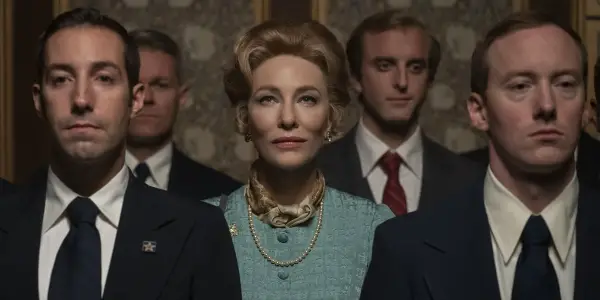
In Mrs. America, Davhi Waller takes a fresh look at the past of feminists and conservatives in the United States of America. Alongside many outstanding directors such as Anna Boden, Ryan Fleck, Amma Asante, Laure de Clermont-Tonnerre, and Janicza Bravo, Waller shows the viewers the fierce fight for the ratification of the Equal Rights Amendment. The movement led by Gloria Steinem (Rose Byrne) suddenly has an unexpected opponent. Phyllis Schlafly (Cate Blanchett) comes out of her husband’s shadow to (ironically) oppose the ERA and speak out for all the homemakers and women who want to stay home, and take care of their children. In contrast, the husband is the only one who provides.
All actresses deserve the applause, although it is difficult to enumerate them – there were so many! It’s always exceptionally hard to portray someone who lived and breathed. But Blanchett does so, and exceptionally well. The way the actress changes her way of talking and speaking is extraordinary. She studied the character of Phyllis Schlafly for a long time to achieve the highest authenticity. Byrne keeps up with her and showcases the Steinem with her calming voice, but the heart of a tiger. Mrs. America is an extraordinary limited series and one of the best shows of 2020. It’s wicked, empowering, and, at times, frustrating. Everybody should take some time and watch its nine episodes. – Zofia Wijaszka
Normal People
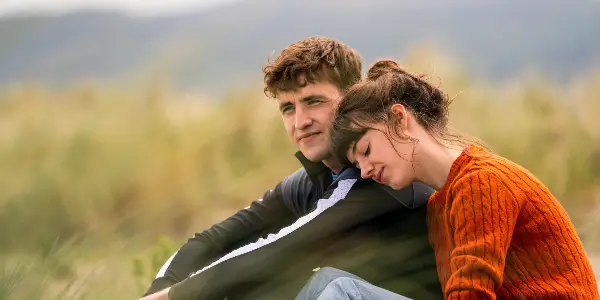
Normal People was released just as the UK was beginning to settle into its first national lockdown. The timing of the show’s release may go some way to explaining its phenomenal success. With the nation spending more time than ever in front of their TVs and on social media, Normal People was perfectly placed to cause a frenzy. Not only was it prestige television when we needed it most, but it gave Twitter two new stars to fawn over. It also appealed to our emotions on a near-primal level when we were feeling at our most vulnerable. An agonizing story of love gained and lost, lost and gained, it had such a ferocious intensity that its bite-sized 30-minute episodes were probably all we could handle.
The aforementioned stars, Daisy Edgar-Jones and Paul Mescal, were the basis on which the entire series depended. Sally Rooney’s source novel was already extremely popular, but on-screen finding the perfect Marianne and Connell helped the story explode into the mainstream consciousness. Mescal and Edgar-Jones were both outstanding, with the former’s magnetic performance in a riveting, grueling therapy session proving a particular highlight. The chemistry between them was unlike much else we have seen on screen, exploding in much-talked-about sex scenes. The show’s approach to this felt almost quietly revolutionary. More graphic than almost anything else on TV, but handled with respect and sensitivity, it struck a perfect balance between embracing sensuality and embracing reality. Glossy Hollywood montages were replaced with raw, honest depictions, showing the oft-ignored parts like verbal consent and awkward interactions.
Throughout its 12-episode run, Normal People gave us a relationship that felt at once completely normal, and utterly extraordinary. Extraordinary because it is rare that something on TV can make us feel quite so deeply, ripping out your heart and mending it again. Never make another series, because it’s perfect as it is. – Andrew Young
Pen15 Season 2
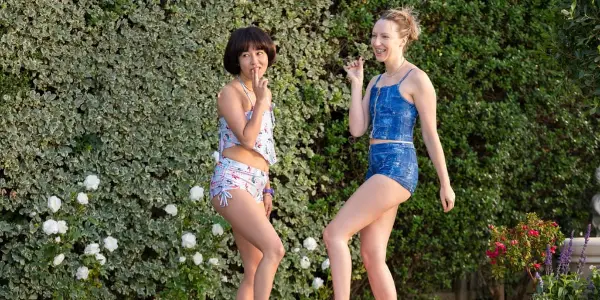
If I can describe Pen15 in one word, it would be cathartic. Yes, on the surface, the show is a raunchy and hilarious comedy about two 30-somethings woman reliving their experiences of middle school. But the main core of the story runs deeper than that gimmick. Underneath all the awkwardness and humor, PEN15 is a show about all the traumatic experiences that happen in middle school; about the insecurity of realizing that you’re not as cool as you assume to be; about what it feels like to be embarrassed in front of your first crush.
Season two focuses even more on this catharsis. We follow Anna as she deals with the messiness of her parents’ divorce. We stick to Maya as she’s discovering her very first heartbreak. Then there’s also a small yet revolutionary thing that the show really excels at: declawing the stereotype of Asian tiger mom stereotype through the character of Maya’s mom — also played brilliantly by her real-life mother.
While its depiction of pubescent trauma is what makes the season more cathartic, the best part of PEN15 remains the friendship between Maya and Anna, with Erskine and Konkle’s chemistry making their relationship all the more authentic. It’s truly a delight. – Reyzando Nawara
The Plot Against America
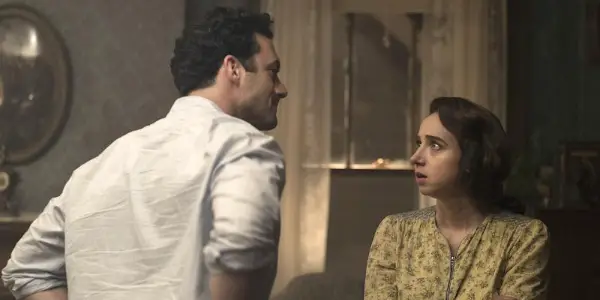
No shows capture American political unrest of last November quite like The Plot Against America. Both illustrating the anxiety of the Trump era and how fascists integrated themselves into governments official in yesteryear, The Plot Against America works like a terrifying cautionary tale, but also often feels like something that has happened and even might still be happening. Based on Philip Roth’s 2004 novel, this David Simons and Ed Burns’ HBO limited series explores an alternate America where Franklin D. Roosevelt lost the 1940 election to Nazi-sympathizing American young man, Charles Lindbergh. But what’s so fascinating about it is how not too alternate the series feels.
The show is at its best when we’re allowed to look deep into the dire consequences of letting fascism and abuse of power dictate a country. And there are plenty of moments where we’ll get to see those consequences being depicted in a really terrifying — but not always disturbing — way. It’s a tricky playground to play with, but Simons, Burns, and the cast marvel from start to finish. – Reyzando Nawara
The Queen’s Gambit
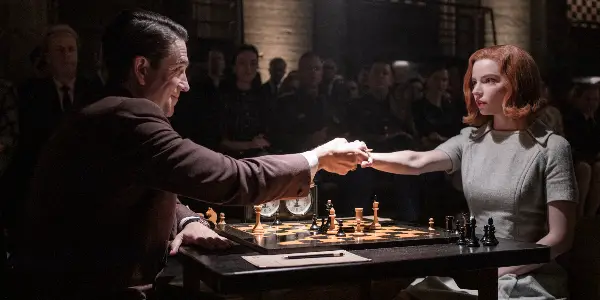
Who says monoculture is dead? More than any other series in 2020, The Queen’s Gambit was a phenomenon, an event that “had to be experienced,” traveling across word of mouth like wildfire. But should we be surprised? If anything, the show’s success highlighted the thrill of watching a series where every piece feels in sync and considered; from writing to casting, and on up to directing. TV is ultimately a collaborative medium, one that requires flexibility and the ability to change and evolve over time. That malleability often makes it rare to come across something that feels as though it’s from a singular voice, in this case, creator Scott Frank.
However, The Queen’s Gambit would also be nothing without the star at its center. As chess prodigy Beth Harmon, Anya Taylor-Joy displays the magnetism and screen presence of someone who was born to be a movie star (or I guess in this case TV.) Many viewers likely recognized her from recent horror films such as The Witch or Split, but The Queen’s Gambit gives her space and room to explore her instincts as an actor through the kind of meaty part that so rarely goes to those her age. Over the series’ seven episodes, the aspect of Taylor-Joy‘s performance that you become transfixed by is her eyes. She may in fact be the most skilled and nuanced face-actor of her generation, able to convey a cosmic array of different thoughts and emotions through the slightest glance around a room or glair at an opponent. That gift lets her pull back, allowing her physicality to become more statuesque while forcing the viewer to look closer as if the slightest change in expression were enough to unlock the secrets of such an introverted character. – Jesse Nussman
Ramy Season 2
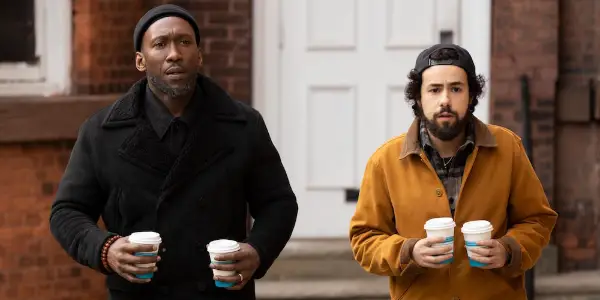
There’s simply no other show quite like Ramy. On the surface, it may just look like a semi-autobiographical comedy about another male comedian trying to be his better self. And for quite some time, it does look like it. But Ramy isn’t just a comedy we’ve seen countless times before, as the core of the story also deals with faith and compelling human journey to be the better version of themselves.
Season two delves into these subjects even deeper by challenging Ramy to grow outside of his comfort zone, and while doing so, it offers us a glimpse into the other supporting characters’ journeys as well. For Ramy, he has to learn how to respect both other people, including his family, and himself. The show basically shows us that the process of being a better person is not a straight line nor it is an easy one. And to see that play out in an honest way possible is such a rare experience. – Reyzando Nawara
Superstore Season 6
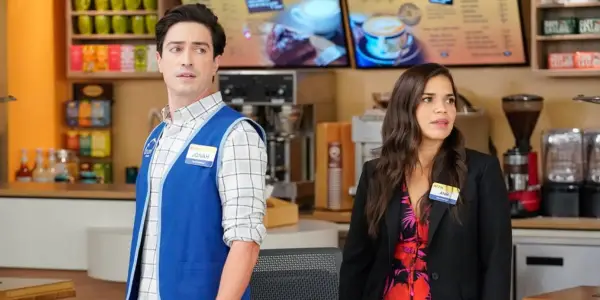
For six years, Superstore has humorously entertained, bringing the plights and stress of retail life to comedic proportions. Now in its sixth and final season, Superstore returned from an abrupt end to their fifth season earlier in the year – an abrupt end brought on by the global pandemic. When Superstore returned, they did not hold back on their handling of the pandemic, and their delivery couldn’t have been more humorous and wholesome. From the pandemics’ first announcement and lockdown, to the toilet paper crisis of 2020 and quarantine, Superstore did not look away, tackling as much as they could in the most detailed and nuanced manner.
While Superstore always struck a deep funny bone as I once managed a retail store, this latest season transcended a typical retail worker stance. Honoring the essential workers that kept our quarantines safe and possible, you do not need to be an essential worker to find humor in each element showcased. We all experienced the shortage of toilet paper on some aspect of the spectrum, we each had our opinions regarding masks, and we all worked through the comprehension of what was happening all around us. We all might have had a different lens, yet not as different as we might think, and Superstore is a testament to that.
We needed this humorous take on the year, to laugh at one another and the situation we find ourselves in. Delivered tactfully and with precision, Superstore leans into the humor and into 2020 embracing, rather than fearing or avoiding. While the series still has its final half remaining, these first few episodes of their final season are a comedic documentation of the year, but more importantly the power of art to lift the spirit and give temporary reprieve to the soul. – Stephanie Archer
The Vow
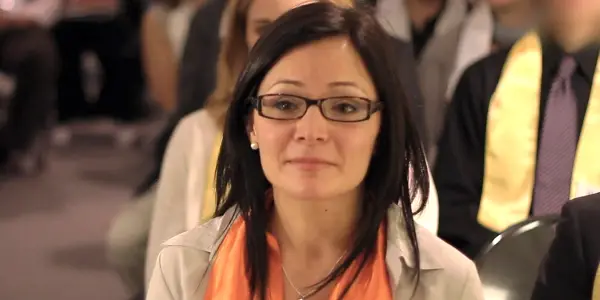
The Vow, if nothing else, is one of the most unforgettable series of 2020. This docu-series follows the accounts of those involved in NXIVM, an organization that started as a self-help group, one that circulated a lot in some of the wealthier crowds, and one that was hiding something horrible behind closed doors, sort of secrets. While I’m not going to account for all of their transgressions and the deep manipulation that started from the highest levels within the group, it included such horrors as sex trafficking. It’s a series that consists of nine episodes, and as you begin with a hard-hitting stunner, you wonder – how can this get more screwed up? It does and continues to be, leaving you unsettled and sympathetic to those on camera, who were duped by those they thought of as family. As with any true-crime docu-series, you’re often confounded by the curiosity to know, mixed with the conflicting nature of, should I? You should.
It’s a psychologically draining, but also disturbingly fascinating, story. More than anything, watching made me feel empathetic. This is some difficult stuff to swallow, but it happens, and therefore should be known. I’ve rarely (and I’m a true crime connoisseur) seen such a narcissist displayed on the screen. With so much of this series consisting of actual video and audio recordings, there’s no doubt, this is a story that is unforgettable. It digs in, leaving you feeling uncomfortable, but rightfully so. It seems that there may be another season, and while I have mixed emotions regarding this, I can’t deny the desire for more knowledge. Regardless of how instinctively F’d this is, there are many stories to be told. I’m always on the side of truth. – Kristy Strouse
We Are Who We Are
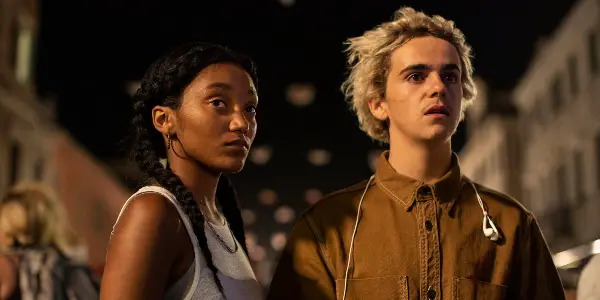
Luca Guadagnino’s We Are Who We Are is eight episodes of spellbinding, extravagant grandeur from start to finish, a gorgeously rich portrait of identity, sexuality, adolescence, relationships, grief, and love that envelops the viewer insensitivities that feel fully developed in their emotional resonance. We Are Who We Are is the apotheosis of Guadagnino’s best narrative sensibilities, achingly human in its approach to telling the stories of unique individuals brought together at a very important time in their lives. This is matched by the delicate, tender performances from the entire cast, a terrific ensemble of characters that we can all relate to in one way or another.
Guadagnino shows the importance of finding yourself in a stage of your life when you feel pressure coming from a lot of different directions and the way he’s able to capture fleeting moments of youthful passion is truly incredible. But another thing he handles so well is capturing the distinct feeling of mundanity. Life is made up of too many moments for us to keep track of, and Guadagnino ensnares the feeling of attachment that we grasp and tie to specific scenes in our lives. He’s able to paint a portrait of people discovering themselves through observations of their daily lives and their reactions to events that occur around them.
Guadagnino frames these characters within their own worlds, detailing their headspace without having to tell us a lot about them. In eight episodes, it’s able to convey more through visuals and dialogue than many shows are able to do in twice that number. Guadagnino takes his time building to specific movements in the script, but he doesn’t waste time hovering over details unnecessary to the task at hand. Every moment feels meaningful and like a direct building block to a bigger purpose in the narrative, and they all pay off in brilliant ways. We Are Who We Are explores a specificity in time that feels directly rooted in intimacy and feeling rather than time. Guadagnino is able to take a multitude of characters and efficiently juggle their stories in complex manners.
While the show ultimately isn’t flawless, it’s a gorgeous miniseries and a truly special experience that will tear your heart apart and piece it back together in the most lovely way possible. It’s an astoundingly powerful and immensely important rumination on many things that shape our lives in soulful, touching ways, and a colossal, shattering achievement on every level. – Owen Butler
What’s your best TV show of the year? Let us know in the comments below!
Does content like this matter to you?
Become a Member and support film journalism. Unlock access to all of Film Inquiry`s great articles. Join a community of like-minded readers who are passionate about cinema - get access to our private members Network, give back to independent filmmakers, and more.
Reyzando Nawara is a passionate film and TV enthusiast from Indonesia. When he's not watching TV and movies, he likes to cook and make sorbet.













